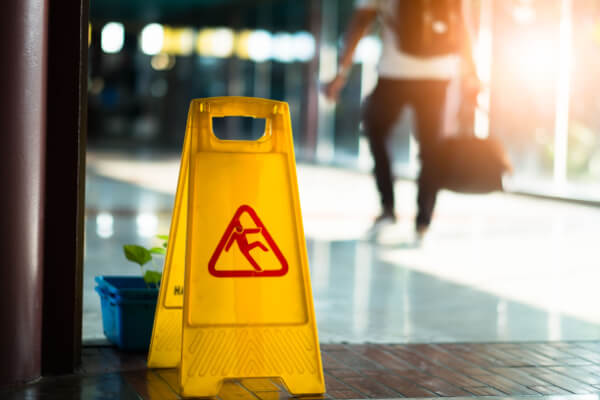Home »
Have you suffered an injury as a result of a slip-and-fall incident at work? You’re hardly alone. While there is all manner of ways to get hurt at work, slips, trips and falls rank at or near the top.
There are lots of ways to crunch the numbers, but this from 2020 provided by the Centers for Disease Control and Prevention is the most telling: Slips, trips and falls accounted for 18% — nearly one-in-five — of nonfatal workplace injuries that resulted in days away from work.
Moreover, slips, trips, and falls consistently rank in the top three workplace incidents that result in emergency treatment, alongside getting hit by objects and equipment, and the body’s response to overexertion.
Any number of factors can play a role in a slip-trip-and-fall event, including:
- Icy, oily, greasy, or wet floors
- Unprotected walkway sides or holes, poor lighting, clutter, or low-lying obstacles
- Ladders, lifts, stairs, roofs, or high-rising construction areas
Being alert and aware can help avoid slip-trip-and-fall episodes, but workers compensation law is designed to eliminate the element of blame. The key elements are simply whether the incident happened at your workplace or was connected to your employment activities.
“In Pennsylvania, and in most states, you are entitled to workers’ compensation benefits regardless how the injury occurred,” says Daniel J. Siegel, a workers comp attorney based in the west Philadelphia suburb of Havertown who’s also Secretary at American Bar Association, Law Practice Division.
“For example,” Siegel says, “with slip-and-fall cases, it does not matter whether you fell because of a dangerous condition or were a klutz. You are still entitled to benefits.”
Also keep in mind the variety of maladies that can result from a slip-and-fall event: Head injuries, spinal injuries, back injuries, broken bones, sprains, strains, tears and/or wounds.
Remember, too, that the extent of your slip-and-fall injury, or injuries, may not be known immediately. You may pick yourself up, dust yourself off, and think nothing is bruised but your ego … only to discover, in the days and weeks that follow, back soreness, stiff joints, or recurrent headaches.
Maybe your workplace isn’t like a boxing match, but the referee’s instruction applies: Protect yourself at all times. Here’s how.
What Should You Do If You Slipped and Fell at Work?
To reiterate: No matter how you feel immediately after a slip-and-fall (or even a slip-and-caught-yourself) incident, report what happened to your employer (through your supervisor or someone up the chain of command, or a human resource officer), at the soonest possible moment.
It may be that your injuries require medical attention right away. Do not let reporting get in the way; your wellbeing is more important.
Says Attorney Siegel, “Always report the incident as soon as it happens … or as soon as you can.”
Other key ingredients:
- Document the incident. Take photographs of the scene; sketch a diagram; interview witnesses; confirm what you told your employer’s representative with a follow-up email; while your memory is fresh, set down in a notebook, diary, or document in your personal computer your recollection of the events surrounding your tumble.
- Talk to at least a small handful of local workers compensation attorneys. Bring your evidence and notes. Initial consultations usually are free, and if your claim runs into snags, your lawyer will have copies of your documentation and a firm grasp of the issues.
Factors Affecting Workers Comp Eligibility After a Slip and Fall
As Attorney Siegel noted above, the elements of a successful workers compensation claim do not shift based on the accident itself. Workers comp covers employees injured on the job while performing activities in the course of their employment.
Accordingly, a slip-and-fall event is treated the same as a repetitive-motion injury, a back strained from heavy lifting, getting rear-ended while driving for work, or being exposed to toxic fumes.
Generally, however, workers comp claims involve injuries or illnesses that result in medical costs and cause the employee to miss work time. Bruised egos certainly do not trigger workers comp benefits (pain and suffering are not covered — more on that below), and neither, usually, are bruised knees. (Now, if your patella is dislocated, that’s a claim of a very different color.)
The Claims Process for a Slip and Fall at Work
Making a claim for a slip-and-fall episode at work should be straightforward: Workers compensation is a no-fault insurance system designed to provide care and compensation to eligible employees injured or sickened on the job without trying to sort out who was responsible.
Were you injured in a slip-and-fall incident while carrying out your work assignments? Are you a covered employee? If the answer to both is yes, you most likely are covered by your employer’s workers compensation insurance policy.
Filing a claim is the same without regard to the nature of the work-related injury. The key steps include: Documenting the incident and everything that follows; getting medical treatment; reporting the event to your employer; filing the correct form for the incident report; following up and keeping track of your claim’s progress; attempting to resolve any disputes with the insurer or employer in a timely fashion.
We said it was straightforward. We didn’t say it was uncomplicated.
Reporting the Accident
Tell your employer (which includes your supervisor, an administrator, or a member of the human resources team) as soon as reasonably possible. Most states have a 30-day deadline for reporting. The report can be delivered orally or in writing (including email).
Gathering Evidence for the Claim
Leave nothing to interpretation. Write a complete and detailed narrative while your memory is fresh. Take photos. Preserve the names and contact information of witnesses. Be complete and accurate in your report to your doctor; get a copy of his report for your records.
Roles of the Employer and Insurance Company
Most states require employers to carry workers compensation insurance and to have an understanding of how the claims process operates. In exchange for premium payments, workers comp insurers are supposed to pay medical and rehabilitation expenses connected to the workplace injury, as well as make compensation for lost wages for the period of time the employee is sidelined.
Within that structure, however, exists a fair amount of wiggle room; both employers (who want to keep premiums low) and insurers (who want to limit, or even deny, payouts) have been known to push the boundaries of what is expected or reasonable.
In this climate, workers who suffer work-related slip-and-fall injuries need to prioritize, protect, and maximize their best interests. Everybody on the other side will have seasoned experts and legal representation. And they’ve seen a lot of slip-and-fall claims.
Most likely, this is your first experience with a slip-and-fall claim. Not that there’s anything wrong with that. But rookies without good coaches can make needless mistakes. Consider getting yourself a legal team to prevent costly, unforced errors. Workers compensation attorneys don’t get paid, unless they win your case, so there is no risk in talking to a lawyer.
Challenges You May Face During a Workers Comp Slip and Fall Case
Remember, your employer and its insurer may attempt minimize the extent of your slip-and-fall injury. Some of the obstacles you should anticipate include:
- Your employer may attempt to downplay the seriousness of your injuries. Often, employers assert injuries aren’t work-related, that they resulted from some off-the-job pursuit. Or that you’re not hurt as badly as you claim.
- Sometimes, employers fail to carry out their responsibilities in the filing of workers comp claims to insurers.
- Injured employees sometimes are hesitant about filing a workers comp claim for fear of retaliation, retribution, demotions, getting pressured to quit, and so on. All this sort of blowback is illegal under every state’s workers compensation laws.
- Your claim may be denied, even if you have followed all the correct procedures. Sometimes, denials arise for clerical errors or oversights; these can be quickly overcome. Sometimes, however, insurers deny even well-founded claims.
By following the steps above about preserving evidence and documentation, meeting deadlines, and being honest and complete with your doctor, you already have most of the weapons you need to combat denials.
Also, if you consulted attorneys early in the process — even if you failed to retain one — you already have potential legal experts who are familiar with your case.
If you didn’t consult or retain an attorney, but you have your documentation, evidence, copies of forms and doctor’s reports, there’s still a chance a good workers comp lawyer can get up to speed.
Benefits You Are Entitled to After a Slip and Fall at Work
Employees injured in a work-related slip-and-fall incident may be eligible for the full gamut of workers compensation benefits. Depending on the severity of the injury, or injuries, a successful claim can include:
- Payments for necessary medical treatment.
- Physical and/or occupational therapy.
- Vocational rehabilitation (if you cannot return to your previous line of work).
- Lost wage compensation.
- Disability payments (temporary or permanent).
- Death benefits to survivors.
This vast field of potential benefits often can be maximized on the injured worker’s behalf by hiring a workers comp lawyer. A key study by Martindale-Nolo indicated workers represented by attorneys received benefits 30% higher than workers without lawyers, an average of more than $5,000.
Additionally, notes Attorney Siegel, “If you fell because a third party (not your employer) was negligent, you can make a claim against that party as well and be compensated for your pain and suffering.”
Sources:
- N.A. (2022, July 26) Traumatic Occupational Injuries. Retrieved from https://www.cdc.gov/niosh/injury/fastfacts.html
- N.A. (2020, February 25) Most Common Workplace Accidents And Injuries. Retrieved from https://www.lluislaw.com/most-common-workplace-accidents-and-injuries/
- N.A. (ND) What Injuries or Illnesses Are Not Covered By Workers' Comp? Retrieved from https://www.nolo.com/legal-encyclopedia/what-injuries-or-illnesses-are-not-covered-by-workers-comp.html
- Feldman, Mitch (2022, October 4) How to File a Workers’ Compensation Claim in Florida. Retrieved from https://www.floridatrialattorneys.net/blog/how-to-file-workers-comp-claim-florida/
- N.A. (ND) What is the workers’ compensation claims process? Retrieved from https://www.insureon.com/small-business-insurance/workers-compensation/how-to-file-a-claim
- Hoffman, James (2022, July 7) 4 Common Problems With Workers’ Compensation Claims. Retrieved from https://www.hoffmannworkcomp.com/4-common-problems-with-workers-compensation-claims/
- N.A. (2016, May 29) Is a Workers' Comp Lawyer Worth the Cost? Retrieved from https://www.lawyers.com/legal-info/workers-compensation/workers-compensation-settlements-awards/does-a-workers-comp-lawyer-give-you-a-better-outcome-is-it-worth-the-cost.html


